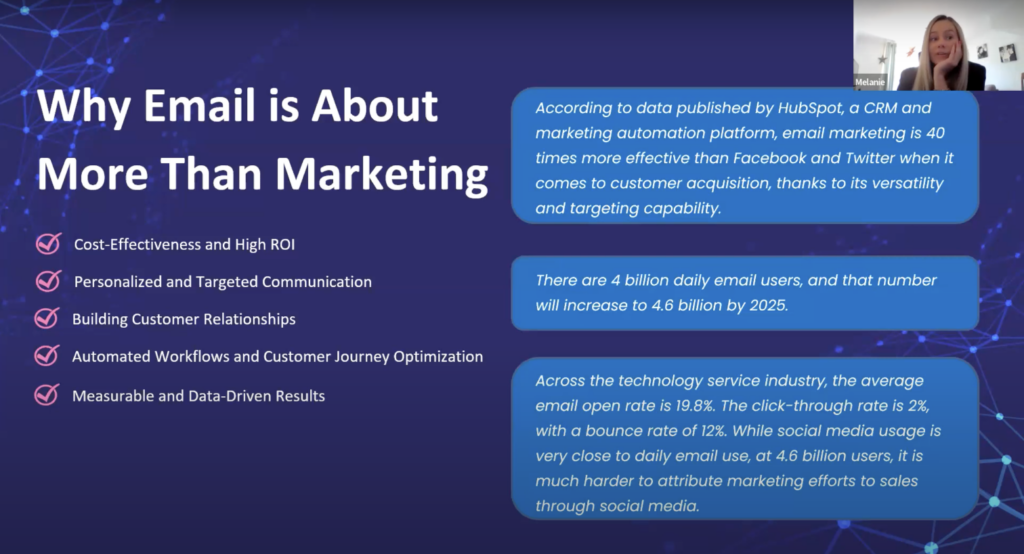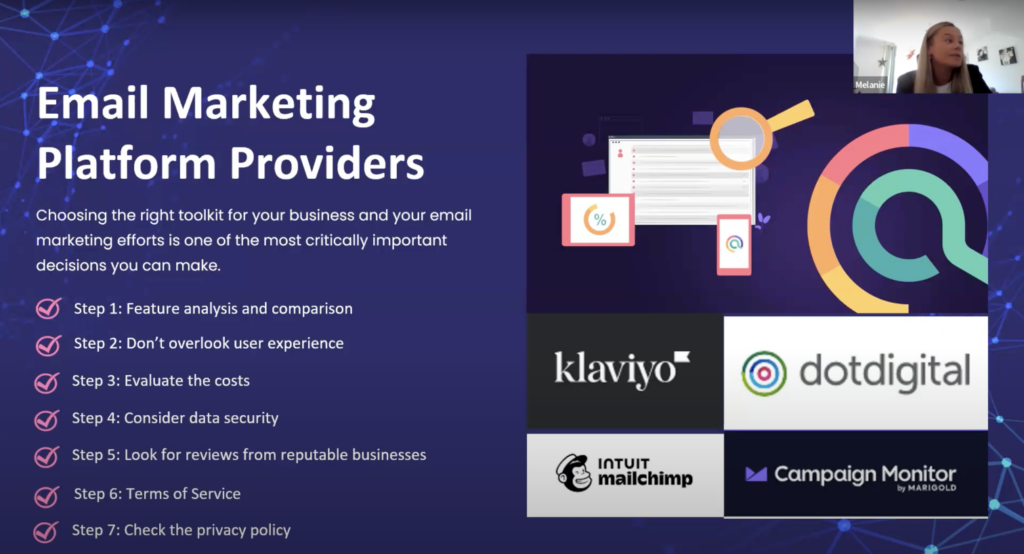Welcome to Ecommerce Camp, where today’s topic is Email Marketing Dose Boost. We will talk about how to supercharge your email marketing.
First of all, I would like to start by saying thank you to our partners and sponsors. Our program is completely free thanks to them.
Today’s presentation is all about unleashing the power of email marketing for ecommerce success.
In this digital age where technological advancements and online platforms dominate the business landscape, email marketing remains a powerful tool for engaging with your customers, driving sales, and boosting overall business growth.
So today we’re going to explore the numerous advantages that email marketing offers for e-commerce enterprises and understand why it continues to be an essential component for any successful marketing strategy.
Why email marketing is about more than marketing
I guess the best thing to start with is why email marketing is more than just marketing.
We’ve got some data here to go alongside.

- According to data sourced from HubSpot, the CRM, and marketing automation platform, email marketing is 40 times more effective than Facebook and Twitter when it comes to customer acquisition thanks to its versatility and targeting capability.
- There are 4 billion daily email users and that number will increase to 4.6 billion by 2025.
- Across the technology service industry, the average email open rate is 19.8%. The click-through rate is 2%, with a bounce rate of 12%. While social media usage is very close to daily use, at 4.6 billion users, it’s much harder to attribute marketing efforts to sales through social media.
We want to look at some of the reasons why email marketing is about more than email marketing.
1. Cost-effective with a high ROI
Email marketing provides an exceptional ROI (return on investment) for ecommerce businesses. It normally has minimal upfront costs. Sometimes in certain cases, it can be free, depending on how big your client base is at the start. Moreover, it can reach a large audience.
It does offer a cost-effective marketing solution compared to traditional marketing channels like print or direct mail.
Email campaigns require significantly lower resources and deliver impressive results.
2. Personalised and targeted communication
So, again: one of the greatest advantages of email marketing is the ability to deliver personalised and targeted communications to customers.
Ecommerce businesses can segment their customers based on various parameters such as the purchase history, preferences demographics, or engagement levels and by tailoring messages to specific customer segments.
Thus, it leads to higher engagement, improved customer loyalty, and ultimately increased sales.
3. Building customer relationships.
It’s good for building customer relationships.
Email marketing allows ecommerce businesses to establish and nurture meaningful relationships with their customers by constantly delivering valuable content, updates, and promotions to the subscriber’s inboxes.
We can stay on top of the mind and build trust in our audience.
Through email campaigns, we can share educational content. If you’ve got a blog and you offer tips and tricks, it’s a great way to share that knowledge.
Also, we can announce new product launches. Instead of customers not knowing or visiting our site, we can be at the forefront of their minds.
We’re going to bring on a new brand or new product types and we can also deliver great customer service by creating some great flows along the user journey.
4. Automated workflows & customer journey optimisation
With advancements in email marketing automation, ecommerce businesses can target workflows that guide customers through their purchasing journey.
Automated emails can be triggered by specific customer actions, such as abandoned cards, product views, or complete purchases.
You can send timely and relevant emails that nudge customers further down the sales funnel, so it helps us optimize the customer journey and also maximizes conversion rates on that end of the sales funnel.
5. Measurable And Data-Driven Results
By tracking things like open-rate click-through rate conversions and revenue, we can gain valuable insights into our customer’s behavior, their preferences, and the effectiveness of different campaigns.
This can be used to refine and build on your strategy moving forward.
There are a lot of benefits to email marketing and we’re going to go through and dive a bit more into the details.
Email Marketing Platform Providers

Just to give you a little bit of background on my experience with loads of providers, 50-plus email providers that offer all kinds of platforms.
In the past, when I worked in companies, I started off doing email marketing campaigns, but I was mostly involved in designing and sending them out when I was briefed by the marketing department. I wasn’t involved in the strategy that much.
But over time, I have used MailChimp, Campaign Monitor, Sender, Dotdigital, and Klaviyo. A lot of them have been used over time.
As I’ve noticed, everything has become more complex, and more user-friendly, making workflows quicker.
It’s good to have an understanding of the different platforms and what they offer to make your work life as best as possible when you’re enhancing your email marketing.
So, yeah, choosing the right toolkit for your business is critically important.
There are a lot of providers out there, so you might need to understand your business and look at what options are best for you.
Some of the things to look at are:
Step1. Feature analysis and comparison
It’s possible you’re interested in a more feature-complete email service provider out there, and then find out which ones don’t fit your needs. It’s also important to consider your needs first and find a provider that complements them accordingly.
Pay attention to the core features at first:
- How many contacts can you store in their database?
- How many emails can you send per day?
- How many users can you have within the same account simultaneously?
These can be more impactful than anything.
I would agree on costs and the amount of email marketing that you can do.
So, define what is essential for your business first and then build from that understanding until you have a list of required features that you need to start investigating who would be best to provide those for you.
Once you understand the features that you would need and you’ve narrowed down your list, dive a little bit deeper.
For example, don’t overlook the user experience.
NOTE:
This is a script of our in-depth webinar with Melanie Day, delving into secrets to supercharging your email marketing. Elevate your campaigns and drive exceptional results with expert insights, game-changing strategies, and actionable tips.
To further assist you, we’ve made accessing this valuable resource simple. You can easily view the full video recording:

Need Specific, Targeted Advice For Your Store?
Whether you’re embarking on your first steps into the world of e-commerce or already running an established business, don’t hesitate to contact us. Our dedicated team is here to provide unwavering support and assistance throughout your entire journey.




